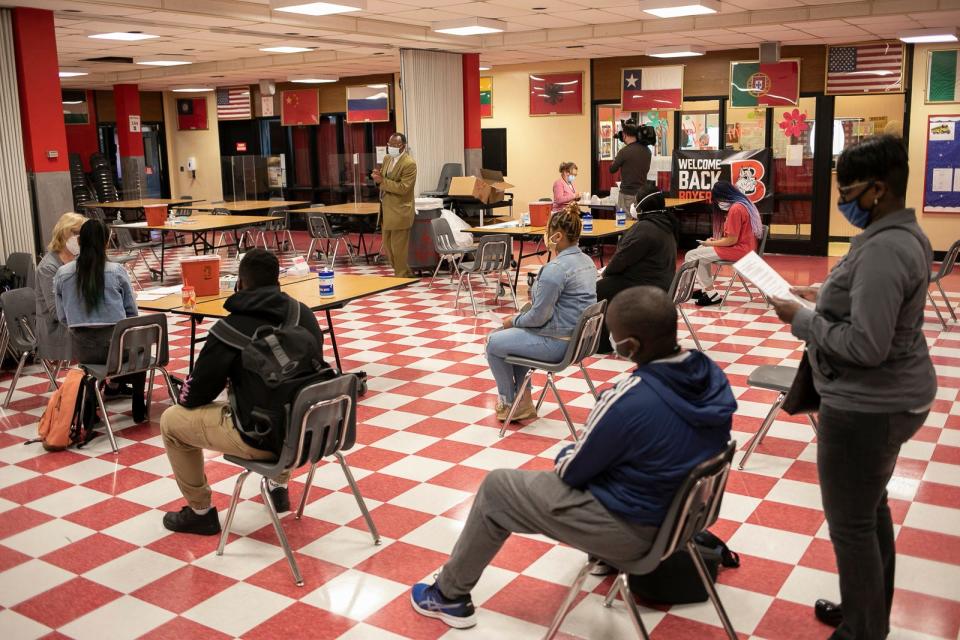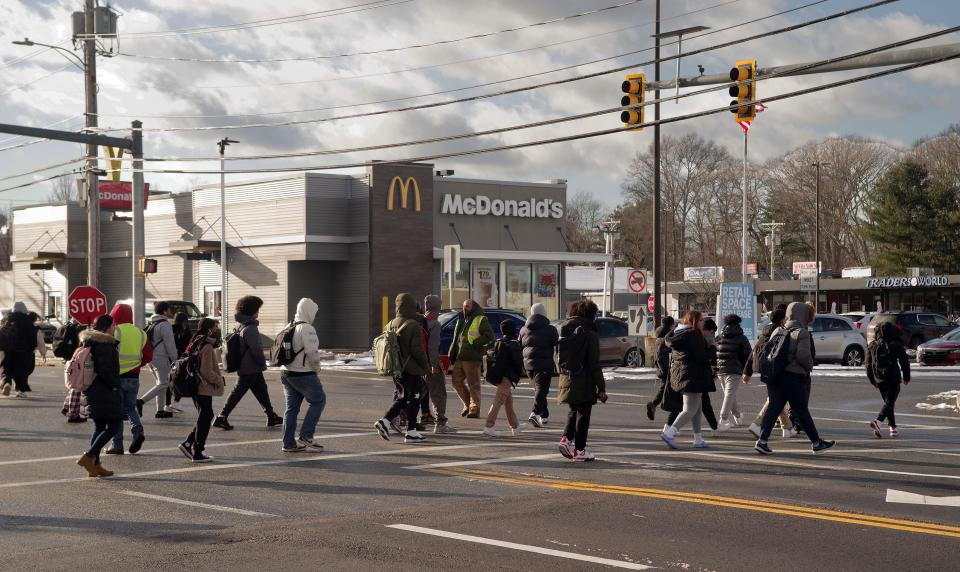Is absenteeism really worse at Brockton High? We compared it to 8 schools to find out
BROCKTON — A 17-year-old high school senior lost her primary caretaker — her grandmother — to COVID during the height of the pandemic. That left her to care for her 10-year-old sister, including getting her to school every day.
By the time the junior would get her sister to school and be able to get back to her own high school, classes would have been in session for over an hour. At first, she would just show up late, but then she started missing a day here and there and it added up over time with more missed days each month.
Quickly, the student was considered chronically absent and she was at risk of not graduating that year, leaving the teenager to make some important, life-altering decisions.
This illustration is one example of issues that can combine to explain why experts say chronic absenteeism has been increasing in public schools, particularly since the start of the COVID-19 pandemic.

In Massachusetts, students are considered chronically absent if they miss 10% or more of the school year, so 18 days in a full 180-day school year.
What is the data on chronic absenteeism?
In the three years leading up to the pandemic, about 23% of Brockton High School students were chronically absent in a given year.
In 2021-2022, the return of full-time in-person learning in Massachusetts, that number skyrocketed to 55% of the city's high school students being chronically absent. On average, Brockton High students were absent 25 days that year.
The following year, in 2022-2023, the number had started to come back down but was still well above pre-pandemic levels with 33% of Brockton High students chronically absent.
How are other districts doing?
In comparison, in 2021-22, the height of chronic absence in recent years, many Massachusetts cities dealt with the same issue. Here are the percentages of students chronically absent in 2021-22 in some other urban high schools:
57% Fall River, B.M.C. Durfee High School
70% New Bedford High School
43% Lawrence High School
39% Taunton High School
Near Brockton, most towns did not deal with the kind of high levels of chronic absence as the cities were facing. Here are the percentages of students chronically absent in 2021-22 in some nearby suburban high schools:
30% East Bridgewater Jr./Sr. High School
20% Easton, Oliver Ames High School
25% West Bridgewater Junior-Senior High School
23% Bridgewater-Raynham Regional High School
"Normally when we see a high level of chronic absence, it's often connected to these positive conditions for learning being significantly eroded," said Hedy Chang, the founder and executive director of Attendance Works, a national and state level initiative aimed at advancing student success by addressing chronic absence.
Brockton thrust into national spotlight Brockton National Guard request especially hurtful in 'Blackest city' in MA, opponents say
Brockton Public Schools spokesperson Kelsey Lynch declined to make the superintendent or any other administrators available for an interview regarding chronic absenteeism in the city's schools.
Jacqueline Reis, a spokesperson for the Massachusetts Department of Elementary and Secondary Education, also said she didn't have any state officials available for an interview.
Mental healthy impacts of pandemic Brockton navigates mental health crisis inflamed by pandemic, racial inequity
COVID leads to increased chronic absences
Brockton School Committee Ward 2 representative Claudio Gomes, a 2018 graduate of Brockton High School and one of the newest elected members, said absenteeism is nothing new but COVID has led to an increase in rates.
"Post-COVID, things have changed a little bit because there are a lot of new stressors that families and kids have that could lead to increased issues," he said. "There could be a disconnect, there is a lot of social media influence on kids these days. It's a myriad of factors that come into play when it comes to students being absent."
Gomes said the school committee and district are working on ways to reduce student and teacher absenteeism and connecting with parents to make sure they have the support they need, but he said he didn't have any other specific information he could share at this time.
COVID hot spot at height of pandemic Brockton, a coronavirus hot spot, searches for reasons behind surge in cases
Why Brockton students might be at risk of chronic absenteeism
Chang said African American communities were more impacted by COVID, and in return, face additional issues related to increased absenteeism that were exacerbated by the pandemic.
"The pandemic — the disruptions, the health issues, the economic challenges — all affected schools with higher proportions of low-income kids more," she said.

Carla McCullough explains the impact of social and economic conditions
Carla McCullough, a filmmaker and educational leader who penned an opinion piece titled "Another epidemic is causing Black students to fall behind: Chronic absenteeism" for The Hechinger Report at Columbia University, said there are additional social and economic realities that students face in a city like Brockton that would make them more susceptible to increased chronic absenteeism.
"COVID was one driving force, but this was already a problem long before the pandemic," she said. "Once students were at home, parents were able to see what was going on in the classroom through Zoom and that is part of what derailed parents from being adamant about sending their kids back to school once classes resumed. I think students also got used to be at home and they didn't necessarily want to go back to some school environments that are not as welcoming."

"Particularly with COVID and folks losing work, it required some older students to have to go to work to support the family or stay home and take care of young siblings. That might be one contributing factor that required students to be home or be less engaged in school," McCullough said.
Teachers describe life inside BHS Emotional teachers describe shocking levels of violence and chaos at Brockton High School
4 main reasons students miss school
Experts say one of the first steps to addressing chronic absenteeism is determining why students are missing school.
Robert Balfanz, a research professor at the Center for the Social Organization of Schools at Johns Hopkins University School of Education, published "A Report on Absenteeism in the Nation's Public Schools" in 2012. He said there are typically four main reasons for why students miss school and all of them have a higher chance of occurrence in higher poverty areas.
"We found as a national trend that, more or less, rates doubled from pre-COVID to post-COVID, and higher at the high school level and approaching 50% now, which is high," he said.
Balfanz said the four reasons include students having to step into caregiving roles, particularly due to losing a loved one during the pandemic and now being responsible for siblings.
The second reason is that a student could be avoiding something in school because they're being bullied, don't feel safe or might be worried about getting in trouble with a teacher.
Another reason is a prior history of chronic absenteeism that might be influenced by a student thinking the job they get won't be different whether or not they graduate.
And the fourth reason is that students might not fully realize what they're missing and don't see how missing a day here and there can lead to chronic absenteeism.
"It's a serious problem," Balfanz said. "It is something we can do something about, but it is challenging. Even really good efforts don't get rid of all chronically absent kids. We also have to think of ways to mitigate its biggest impacts."
How do you get students to stop missing school
Chang said Attendance Works recommends a tiered approach to deal with chronic absenteeism that always starts with foundational supports for the entire school. The foundational supports are followed by prevention-oriented supports for attendance, more personalized outreach or early intervention and then intensive intervention.
"Finding out what are some of the crutch barriers some kids face is really important because your solutions then need to reflect your understanding," she said. "Do you need to create more access to health care on campuses? Do you need to make sure there's more guidance on whether kids should show up to school or not? Is part of the challenge that there's bullying going on? Is there a lack of connection to enrichment activities and sports?"
McCullough said chronic absenteeism can have a lasting impact on students' lives.
"If you don't even have an 8th grade education when you get to high school, it's going to be so hard for you to keep up, which is going to increase the amount of dropouts and then it decreases the amount of students who are even eligible to attend college," she said.
"The impact that's going to have on our workforce is going to be beyond belief because so many jobs that require a college education are obsolete now."
It’s becoming a mental health crisis. Students are increasingly refusing to go to school.
Gomes said it's critically important to find ways to keep kids in school.
"If you're missing school consistently, you're going to miss out on a lot," the Brockton School Committee member said. "It could affect your social life and relationships. Getting your high school education is crucial for your future endeavors. School provides and opens a lot of doors for opportunity depending on what one wants to do. Not going to school or being absent can hinder one from acquiring that knowledge and building those relationships."
Enterprise senior reporter Cody Shepard can be reached by email at cshepard@enterprisenews.com.
This article originally appeared on The Enterprise: Chronically absent students is problem at Brockton High: What it means

